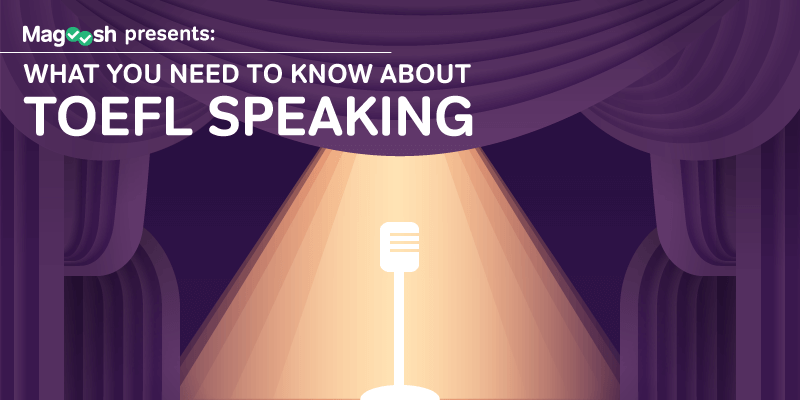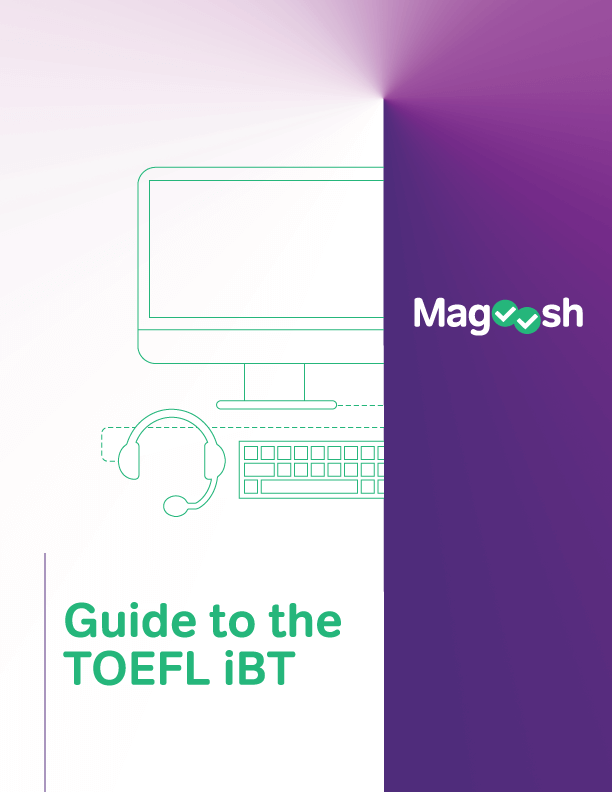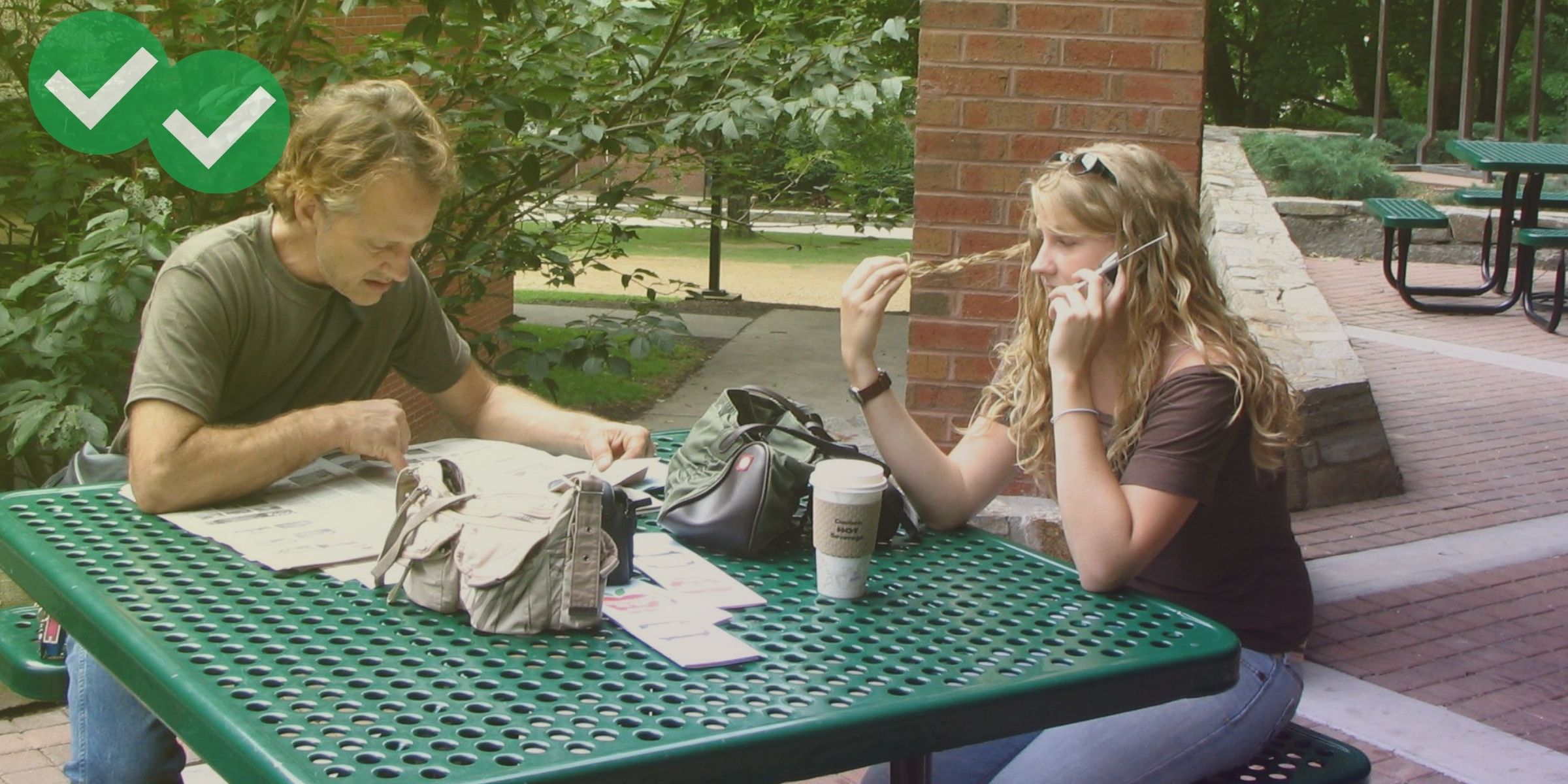Antes de aprender sobre los distintos temas que abarca el speaking del TOEFL, asegúrate de comprender el funcionamiento básico de la sección oral del examen. Nuestra infografía sobre el speaking del TOEFL es un buen lugar para empezar:
Ahora, entremos en detalles…
Diferencias entre las tareas integradas y las independientes en el speaking del TOEFL
Como ocurre con la sección del writing del TOEFL, la sección oral incluye dos tipos de preguntas: “independientes” e “integradas”. En cuanto a los temas, hay una clara división entre ambos tipos: en el speaking del TOEFL, los temas integrados son académicos mientras que los temas independientes se relacionan con experiencias, ideas y opiniones personales.
Los temas “integrados” tienen ese nombre por un motivo: integran el reading y/o el listening con el speaking. Esto significa que la selección de temas integrados del speaking es tan variada como los temas del listening y del reading, y que responder correctamente depende más que nada de tu capacidad de identificar las ideas más importantes de una conferencia o un texto.
En cambio, las tareas independientes solo buscan evaluar tu facilidad para hablar, y no tu habilidad de procesar la información entrante. Esto implica saber comunicarte con claridad.
Primer tema del speaking del TOEFL: elige una entre varias opciones
La primera parte del speaking tratará sobre algo con lo que puedas relacionarte fácilmente. Será una pregunta sobre algún tema amplio que deberás responder desde lo personal. Por ejemplo, podrían preguntarte sobre tu tipo de música favorita.
O podrían preguntarte sobre un familiar, tus hobbies o uno de tus logros. En esta lista encontrarás preguntas tipo estilo TOEFL para que las tengas como referencia. Si empezaste a estudiar inglés de adulto, puede que estas preguntas te resulten conocidas. Son el tipo de preguntas que suelen incluir los libros de inglés para principiantes, ya que emplean casi exclusivamente el presente simple (p. ej. “I love soccer”) y el pasado simple (p. ej. “I played soccer”).
Para responder bien a estas preguntas, es importante elegir rápido un tema específico sobre el cual hablar. Si en el TOEFL te preguntan sobre una persona a la que admiras, es ideal elegir a la primera persona que se te venga a la mente, e inmediatamente después empezar a pensar por qué la admiras.
Segundo tema del speaking del TOEFL: elige tu preferida entre dos opciones
Este tema a desarrollar en el speaking será muy similar a los temas para escribir ensayos del TOEFL. Se te pedirá que decidas entre dos cosas y, después, que justifiques tu elección.
EJEMPLO: Some people prefer work that allows them move around outdoors. Others feel it is more pleasant to work in an office. Which do you prefer, and why?
Nota: ETS solía dar una lista de temas de ensayo de forma gratuita en su sitio web, pero eliminaron esa página. Ahora, para ver dicha lista de temas, necesitas la guía oficial.
De nuevo, este ejercicio se trata de elegir rápido. Solo tienes 30 segundos para responder, por lo que necesitas tomar una decisión cuanto antes para después poder justificarla dando una o dos razones.
¿Gatos o perros?
¿Blanco o negro?
¿Frío o calor?
Y luego viene la parte más importante de la pregunta: ¿por qué?
A ETS, organización responsable tanto del TOEFL como del GRE, le gusta especialmente hacer preguntas sobre educación. Por lo tanto, para prepararte para el TOEFL, es recomendable que practiques hablar sobre tus preferencias de estudio. ¿Dónde te gusta estudiar? ¿Qué tipo de profesores prefieres? ¿Te gusta trabajar solo o en grupos? ¿Qué materias te resultan más interesantes? (Si planeas rendir el GRE, es muy probable que ese ensayo también trate sobre la educación, así que esto además te ayuda a prepararlo).
Temas de práctica para la primera y segunda tarea del speaking del TOEFL
Primera tarea
1. Talk about a purchase you’ve made that you are happy with. Describe what you purchased and explain why you are happy about it.
2. Talk about a time when you found a task harder to accomplish than you expected. What were you trying to accomplish? Why did it become difficult?
3. What personality quality do you think is most important in a good friend? Explain why.
4. Talk about something friend a family member of yours did that you were proud of. Describe what they did, and explain why you were proud.
5. Choose a recent event in your country that people want to talk about. Why are people interested in the event? Explain with specific details and reasons.
6. Imagine the ways in which your country will change over the next five years. Talk about one way you expect it to change. Use details to explain your answer.
7. Choose a famous person who you think would be enjoyable to have a conversation with. Explain why you would like to talk with them, using specific details and reasons.
8. Choose a subject that students study in school but you think is not important. Explain why you feel it is not important to study. Use details and examples in your response.
9. What type of long-distance transportation do you think is most enjoyable? Explain why you like it with specific details and examples.
10. Think of a movie you have not seen but would like to see. Explain why you expect to like the movie. Give specific details and reasons in your response.
Segunda tarea
1. Some people prefer work that allows them move around outdoors. Others feel it is more pleasant to work in an office. Which do you prefer, and why?
2. Do you agree or disagree with the following statement? Use details and examples to explain your answer.
Snakes should never be kept as pets.
3. Some people feel they perform better when they have to finish by a strict time. Others feel they do better work if they do not have time pressure. Which best describes you? Explain why.
4. Do you agree or disagree with the following statement? Use details and examples to explain your answer.
Parents should buy for their children any books that the children choose to read.
5. Do you agree or disagree with the following statement? Use details and examples to explain your answer.
Students should spend more time learning outside of classrooms than within classrooms.
6. In some areas, summer days are longer, so there is more daylight in the evening and early morning, but winter days are shorter. In other areas, summer and winter days are similar lengths throughout the year. Which do you prefer, and why?
7. Do you agree or disagree with the following statement? Use details and examples to explain your answer.
Movies that are longer than three hours should be made shorter by removing less important scenes.
8. Do you agree or disagree with the following statement? Use details and examples to explain your answer.
Parents who do not regularly exercise should start in order to be good role models for their children.
9. Some people prefer to respond to emails, phone calls, and other messages they receive immediately. Others take more time to respond. Which do you do, and why?
10. Do you agree or disagree with the following statement? Use details and examples to explain your answer.
It’s better to reward employees with gifts and job perks, such as gym memberships or English classes, than it is to simply pay more.
Si tu estilo de aprendizaje es el visual, puedes ver estas preguntas de práctica en nuestra presentación de SlideShare a continuación. 🙂
Cómo preparar el speaking del TOEFL
Entre la primera y la segunda tarea, la variedad de temas que abarca el speaking del TOEFL es muy amplia. Si además consideramos las tareas académicas, las integradas, las posibilidades son muchísimas. Lo más importante al momento de prepararte no es aprender todos los temas, sino aprender a dar respuestas completas en muy poco tiempo y bajo presión, y conocer las estrategias adecuadas para cada ejercicio. Una buena forma de hacerlo es rindiendo un examen de práctica tipo TOEFL. Eso lo explicaré en detalle en otras entradas más adelante. 🙂
Esta publicación apareció originalmente en inglés en el blog de Magoosh y fue traducida al español por Giuliana Ferraro.








Leave a Reply